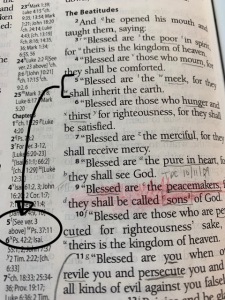Jesus said, “Blessed are the merciful, for they shall receive mercy.” Matthew 5:7
How would you define mercy?
Often, when people think of mercy, they think – as one theologian put it as “compassion for people in need” (Stott 47). And – very often – we think of mercy as acts of mercy – in relation to helping those less fortunate or people who have been impacted by natural disasters.
The Catholic Church often speaks of the Corporal Works of Mercy, which they rightly – I think – state as part of how Jesus expects Christians to treat others. According to the Catholic Church – there are seven Corporal Works of Mercy. They are to feed the hungry, to give drink to the thirsty, to house the homeless, visit the sick, visit the prisoner, bury the dead, and give to the poor.
Most Christians aren’t strangers to the compassionate side of mercy. The church usually is a place known for mercy. Through the ages, churches – Christian folks – have built schools and hospitals and shelters and food pantries. They’ve sheltered refugees and the homeless. They’ve helped to rebuild cities after disasters – like Hurricane Katrina.
And all of that is good work – right? Stepping into the physical needs of others is powerful and it somehow connects the church – the Christian – to Jesus.
I recall something that Malcolm Muggeridge wrote years ago as he reflected on his time with Mother Teresa. Muggeridge, as you may know, was a well-known social and political critic and satirist in the 20th century. He has sharp wit and was a keen critic of pretty much everything – including religion – which makes his observation of his time with Mother Teresa all the more compelling. Muggeridge wrote,
Accompanying Mother Teresa, as we did, to these different activities for the purpose of filming them – to the Home for the Dying, to the lepers and unwanted children, I found I went through three phases. The first was horror mixed with pity, the second compassion pure and simple, and the third, reaching far beyond compassion, something I had never experienced before – an awareness that these dying and derelict men and women, these lepers with stumps instead of hands, these unwanted children, were not pitiable, repulsive or forlorn, but rather dear and delightful; as it might be, friends of long standing, brothers and sisters. How is it to be explained – the very heart and mystery of the Christian faith? To soothe those battered old heads, to grasp those poor stumps, to take in one’s arms those children consigned to dustbins, because it is His head, as they are His stumps and His children, of whom he said that whosever received one such child in His name received Him.
Compassion for those in need – like the poor, the hungry, the sick – is a side of mercy that most Christians understand and easily identify with, but what if there were another side of mercy – a more difficult side of mercy – a side that goes beyond the physical needs and the works or acts of mercy?
What if there is a definition of mercy that takes in more ground than simple compassion?
What if Jesus meant more than helping those in physical and material need when he said, “Blessed are the merciful, for they shall receive mercy”?
Well, I guess you can tell that I think Jesus meant more than the physical and material needs when he talks about mercy. What’s more, the other half of mercy is a tough ask but it is an essential quality of every Christian.
I believe that when Jesus said “Blessed are the merciful, for they shall receive mercy” he wasn’t just talking about helping the poor. I think he was talking about being merciful toward everyone – indeed with every person regardless of race or creed or religion – or whether they are poor and need help or are quite well off.
I believe that because Matthew 5:7 is the only one of the beatitudes that connect to its own promise. Notice, Jesus said, “Blessed are the merciful, for they shall receive mercy.”
If Jesus simply meant us to be compassionate toward the poor when he says blessed are the merciful and I’m the one being compassionate to someone in need, why would I need mercy? Why would I need compassion if I’m the one who is doling out compassion on those in need?
Clearly, Jesus has something more in mind. Jesus is painting a bigger picture of mercy – one that shouldn’t be reduced to compassion or even just acts of mercy. The text speaks to something larger.
But, again, all we have is this beatitude – a statement that is intended to tell us the essential quality of a Christian. So in order to get at what Jesus is telling us in Matthew 5:7, we’ve got to do a bit of Bible work – a bit of research in order to get a better appreciation. We need to go beyond this text and look to another part of the Bible to see how Jesus uses the term mercy.
In Matthew 18, Jesus tells a story about a king who “wished to settle accounts with his servants.” One of those servants owed him ten thousand talents. By the way, in our terms, ten thousand talents would be akin to millions of dollars. In other words, it is an impossible amount of money to pay back. It is a debt the servant can’t pay. But the servant falls before the king and asks for mercy. The king has mercy on him, and he forgave him the entire debt. Get that – the king forgave an impossible debt.
So far so good – right? Well – that very servant goes out and finds a man who owes him 100 denarii. A denarius was a day’s wage. In those days, that was a large debt, but it wasn’t insurmountable. The man pleads to the king’s servant for mercy, but the king’s servant refuses to have mercy on someone just like him – a debtor. Even though the servant had received mercy, he offered none to another person in need of the same sort of mercy he had been in need of. In fact, the king’s servant has the man thrown into prison. He casts him off.
When the king heard what his servant had done, he was outraged. And the king said to his servant, “You wicked servant! I forgave you all that debt because you pleaded with me. [33] And should not you have had mercy on your fellow servant, as I had mercy on you?”
Shouldn’t you have had mercy as I had mercy on you?
Wow-what a question. This idea of mercy doesn’t really focus on the compassion for the poor sort of thing we often think of with mercy. It reveals that Jesus has something more in mind when he talks about mercy.
We should broaden the lense of the parable and see that it is telling us – just as Isaiah 53:6 did – that “all we like sheep have gone astray – each to our own way – but the Lord has laid all the iniquity on Him.” And Paul did in Romans 5 – “for all have sinned and fallen short of the glory of God.” In other words, we are all debtors in need of mercy. All of us.
Remember, each beatitude builds on the previous beatitudes. The first three beatitudes have to do with our relationship with God. They are intended for us to be spiritually self-aware. It starts with the fact that all of us are spiritually bankrupt – all of us have gone astray. We owe a debt we can’t pay. That fact should grieve us – we should mourn and grieve over our sin and the way sin impacts the world. We humbly approach God – in meekness and trust in His strength – and as we do we begin to hunger and thirst to do right and good in the world – which brings us to mercy.
Mercy is really the first beatitude that has other people in mind. To some extent, the first four have to do with personal piety – with a person’s relationship with God. But mercy is something that engages others and, according to the parable, engages them beyond their physical needs. In other words, mercy isn’t limited to people who are poor, sick, dying. Mercy recognizes that every person we encounter is in need of God’s mercy. John Stott wrote, “For to be meek is to acknowledge to others that we are sinners; to be merciful is to have compassion on others, for they are sinners, too” (Stott 48).
D.A. Carson helps to clarify this further. He wrote, “the person whose experience reflects these beatitudes is conscious of his spiritual bankruptcy, grieves over it, and hungers for righteousness. He is merciful toward the wretched because he recognizes himself to be wretched; in being merciful he is also shown mercy” (Carson 25). But you see, the wretched and sinful isn’t limited to simply the poor person or the person in jail. As Jesus’ parable shows, mercy is something that has been given to those who have placed their faith in Jesus and mercy is something that they are to give to everyone they encounter.
Therein lies the challenge, though. Often, when I think about mercy, I get focused on a person in need – or the person who is clearly in need of mercy/compassion. But the reality is – mercy – as a quality of a Christian – is not a narrow focus but a broad one as it encompasses everyone around me. Every person is in need of God’s mercy – just as I am. Each week, I along with lots of other Christians, confess my sin and say, “Christ have mercy. Lord have mercy.” I also pray that the Lord would forgive me debt as I forgive my debtor. Far be it from me then, to be like that servant in Jesus’ parable that I – someone who has received God’s mercy would then withhold it from others.
I don’t know about you, but I find that challenging – which is what I think Jesus intended. It is often easier to show mercy toward those who obviously need compassion. It is much more difficult to be merciful in my attitude toward folks who don’t believe as I do or act as I think they should. But then, I don’t always believe nor act as I should in the eyes of God – but God in his mercy – has redeemed me in Jesus. I need God’s mercy all the time – and does everyone else.
Today, I want to leave you with a question. I’d like for you to take some time today and just think about the ways that God has shown mercy to you. And then, ask yourself how often you’ve shown mercy to others? Or, God forbid, when you’ve withheld mercy from others?



 references in the margin or at the bottom of the page – and if you locate Matthew 5:5 in that cross-reference – you will find
references in the margin or at the bottom of the page – and if you locate Matthew 5:5 in that cross-reference – you will find  Jeremiah 17:9 puts things rather bluntly. “The heart,” Jeremiah says, “is deceitful above all things, and desperately sick (wicked); who can understand it?” What’s more, Jesus said, “The good person out of the good treasure of his heart produces good, and the evil person out of his evil treasure produces evil, for out of the abundance of the heart his mouth speaks” (Luke 6:45 ESV).
Jeremiah 17:9 puts things rather bluntly. “The heart,” Jeremiah says, “is deceitful above all things, and desperately sick (wicked); who can understand it?” What’s more, Jesus said, “The good person out of the good treasure of his heart produces good, and the evil person out of his evil treasure produces evil, for out of the abundance of the heart his mouth speaks” (Luke 6:45 ESV).
 captivated me because
captivated me because